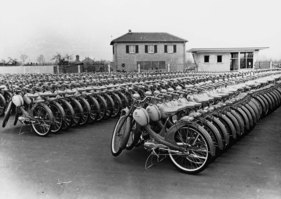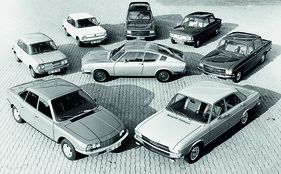"Made in Germany - done by migrants." The German economic miracle. Impossible without "guest workers" at NSU. It took historian Arnd Kolb three years of research and work to come to this conclusion about the Audi plant in Neckarsulm. In the book"Autos - Arbeit - Ausländer: Die Geschichte der Arbeitsmigration des Audi Werks Neckarsulm ", the results can now be enjoyed in an easy-to-read format.
With his meticulous approach, Kolb has delivered a pioneering volume on the history of the company at Audi. He traces the employment of foreigners, which began at NSU in the early 1960s, over the last 50 years. The "guest workers" - previously ignored by automotive history - come into focus here in terms of both social history and factory history. Migration history as part of the corporate identity.
At NSU, where the decision was made around 1960 to transform itself from the world's largest two-wheeler manufacturer into a car manufacturer, there was no capital available for investment in new production facilities. As a result, the company invested in a workforce that was not available in the booming Germany of the 1960s, particularly in the Neckar region. Foreigners "willing to immigrate" replace the lack of capital at NSU and offer the traditional company the opportunity to expand its production and thus its market significance.
However, Kolb not only provides a history of the location, he also examines the consequences for both employers and employees - German and migrant alike - in terms of factory and social history. The influx of unskilled workers meant opportunities for advancement for their German colleagues, while dirty and strenuous production areas were soon being handled 100% by their foreign colleagues. The author also paints a multifaceted picture of everyday life in Neckarsulm. Where and how did the "guest workers" live? How did the population react? How did they spend their free time and when did they want to leave Germany again?
Within 10 years, the proportion of foreigners at Audi NSU rose to a record-breaking 43% in 1973. The first families are formed or join them, the "guest workers" settle in. And suddenly the oil crisis and the associated recession bring the many unfinished social policy tasks to the forefront of the interest of business, politics and the media. How should, how can things continue?
Kolb conducted over 40 interviews with contemporary witnesses and researched several archives before delivering a comprehensive picture of the people with a migration background at NSU. He does not forget to look at the interests in Ingolstadt or Wolfsburg, to classify them and to trace the attitude of the trade unions.
Conclusion: An excitingly written study which, thanks to the evaluated material, forms a unique documentation of foreigners at the Audi Neckarsulm site. And it dispels the myth that the German economic miracle was a purely German one.
The bibliographical references
Arnd Kolb,"Autos - Arbeit - Ausländer: Die Geschichte der Arbeitsmigration des Audi Werks Neckarsulm ", Delius Klasing, 2011, 192 pages, 43 color photos, 163 b/w photos, 18 color illustrations, 5 b/w illustrations, ISBN: 978-3768833769, price: 19.90 EUR.












